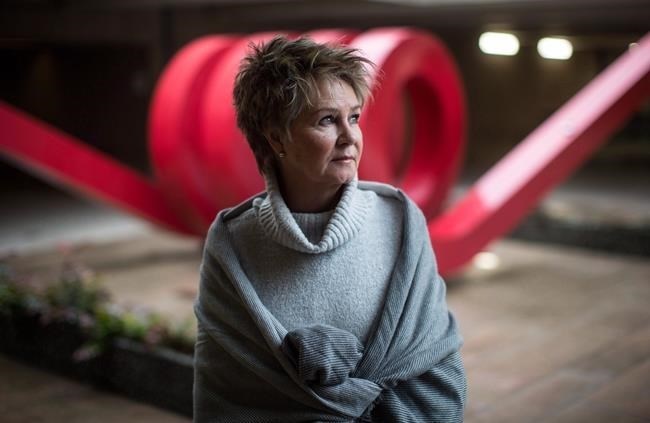
Helen Jennens poses for a photograph in Vancouver, B.C., on Monday January 8, 2018.
Image Credit: THE CANADIAN PRESS/Darryl Dyck
June 23, 2020 - 7:00 AM
When B.C.’s top doctor was moved to tears while announcing the recent spike in overdose deaths, Helen Jennens cried along with her.
“Dr. Bonnie Henry brought attention to the problem when she spoke about it on the TV, but will it make a difference with what is happening?” the Kelowna mom asked.
"And why wasn’t someone crying in 2017, when the overdose numbers were at their worst? In 2015 it ramped up, in 2016 it was really bad and 2017 it was the worst numbers. Why not back then?”
Jennens is a high profile member of Moms Stop the Harm, a group of Canadian mothers who lobby for changes in drug policy hoping to put an end to the onslaught of overdose deaths.
She was thrust into the work she does after her sons Tyler and Rian died, years apart, from drug overdoses. Jennens affectionately called the pair, who were born just 18 months apart, “seek” and “destroy” as children. Their closeness lasted as they grew up and ultimately manifested in drug use that killed them both.
Jennens has made sure that their stories have been told, but has said repeatedly they are no different than the nameless men and women whose lost lives are viewed as statistics of an overdose epidemic first declared a public health emergency in B.C. in 2016.
Each overdose death, she said, should be marked in the same way that every COVID-19 death is — daily — to drive home the message that the overdose death epidemic is present, it’s human and dangerous.
“You know we, with Moms Stop the Harm, hadn’t said it before when the pandemic started because we don’t want to make it seem like sour grapes, but as the pandemic progressed and we see the incredibly urgent response and we start thinking, why was the opioid epidemic comparatively ignored?” she said.
Jennens is one of the voices joining a call to apply the same public information tactics to the overdose crisis.
The idea was recently introduced in a Change.org petition from islander Carina Stone, whose husband Michael Stone, a prominent teacher of Buddhism and yoga, died in 2017 from fentanyl poisoning.
“He is only one number in a long stream of mental health tragedies in this province. He was a public figure, his death was noted by media and culture and many people grieved and still do,” Stone said in the petition.
“And, he is no more missed than every other child, partner, parent, sibling, aunt, uncle, grandparent who are dying every day in this province due to overdose.”
Stone's petion is asking Dr. Bonnie Henry to release the overdose numbers as they become available from the coroner's office instead of as a monthly sum.
“I am struck by British Columbia's response to the (COVID-19) pandemic. How it's been managed, for one, but also our public process of grieving the deaths, reaching our hearts out to families who've lost loved ones,” Stone said.
“Each death is accounted for publicly in a press conference, each number is cause for alarm, process, response. Just a number, but learning in real time is humanizing.”
Stone said she wants Dr. Henry to use her platform to help work towards undoing the stigma and update us on accruing overdose numbers.
“This could happen alongside COVID-19 number releases. These deaths need to become visible,” she said.
“That would be demonstrating to this province that these lives are precious and valued.”
Jennens said changing the tack is a long time coming.
“(Dr. Henry) did such a good job with the pandemic, but every day we hear how many new cases there are in the country, yet we don’t do that for the people who are dying for overdose?” she said. "Why?"
Now, however, may be the time.
In May, a record 170 people died of an overdose in B.C. More than 400 people in B.C. have died from overdosing during the three months COVID-19 measures have been in place.
It's also more than double the total number of deaths due to COVID-19 in the province, which is 168.
Dr. Henry, in announcing these stats, said the deaths represented moms, dads, sons and daughters and that the increased toxicity of street supply is part of the problem.
Jennens said Dr. Henry's approach is something she'd like to see take root at the federal level.
“B.C. has done really well with both opioid and COVID-19, but the attention the opioid crisis got was at the provincial level… it needs to be declared an emergency at the federal level,” Jennens said.
To contact a reporter for this story, email Kathy Michaels or call 250-718-0428 or email the editor. You can also submit photos, videos or news tips to the newsroom and be entered to win a monthly prize draw.
We welcome your comments and opinions on our stories but play nice. We won't censor or delete comments unless they contain off-topic statements or links, unnecessary vulgarity, false facts, spam or obviously fake profiles. If you have any concerns about what you see in comments, email the editor in the link above.
News from © iNFOnews, 2020